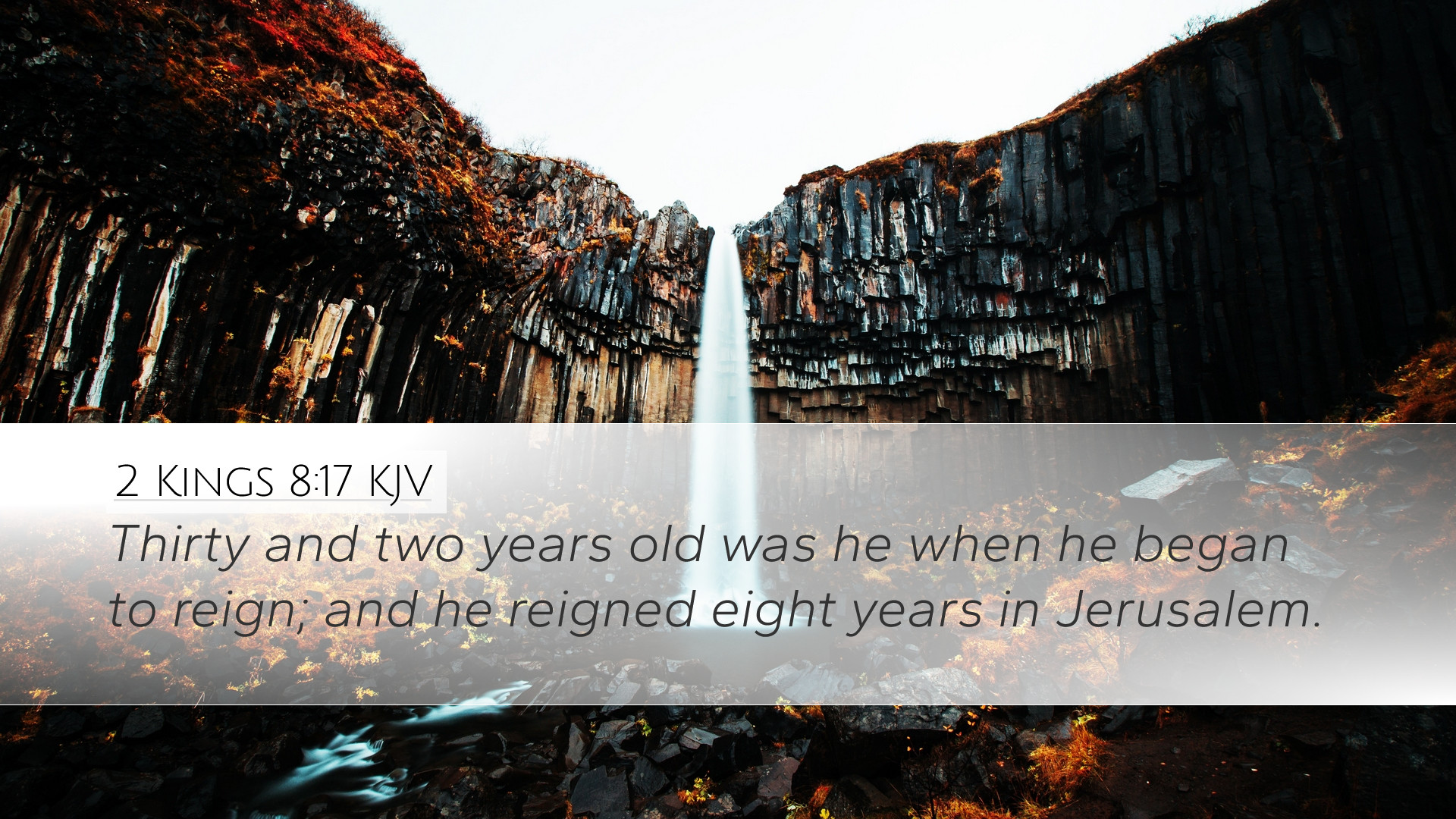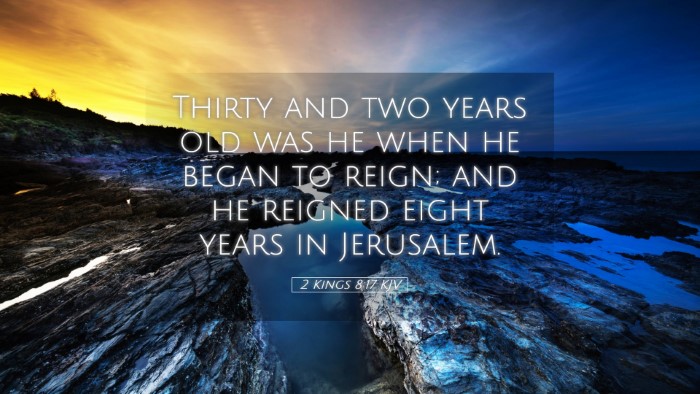Commentary on 2 Kings 8:17
Verse Background: 2 Kings 8:17 reads: "He was thirty-two years old when he became king, and he reigned eight years in Jerusalem." This verse introduces us to Jehoram, the son of Jehoshaphat, and marks his reign over Judah.
I. The Context of Jehoram's Reign
This section examines the historical backdrop against which Jehoram ruled:
- Transition from Jehoshaphat: Jehoram's ascendance follows his father Jehoshaphat, a king noted for his generally righteous reign. However, Jehoram's leadership deviates, aligning more closely with the practices of Israel.
- Cultural Influences: During his reign, Judaic worship began to be corrupted by influences from the surrounding nations, particularly through intermarriage and the introduction of Baal worship.
- Political Situations: The geopolitical landscape was turbulent, characterized by relationships with Israel, particularly concerning the lingering influence of the Omride dynasty.
II. Insights from Public Domain Commentaries
A. Matthew Henry's Commentary
Henry emphasizes the significance of Jehoram's age and the brevity of his reign:
- Age of Kingship: His accession at thirty-two signifies the weight of experience yet juxtaposed with the immaturity of character, as his actions reflect a lack of spiritual wisdom.
- Length of Reign: Eight years, a relatively short reign, emphasizes the transient nature of leadership that demands faithfulness to God, which Jehoram consistently neglected.
- Impact of His Rule: Henry notes the moral decline during Jehoram's rule, the result of abandoning the ways of the Lord, a theme prevalent throughout the history of Israel and Judah.
B. Albert Barnes' Notes
Barnes provides a more detailed analysis of Jehoram’s legacy:
- Historical Relevance: Jehoram's alliance through marriage to the house of Ahab is seen as a pivotal mistake, as it promoted idolatry within Judah.
- Judgment and Consequences: Barnes correlates the reign of Jehoram with Judah's eventual decline, illustrating how spiritual compromise leads to national disaster. His infidelity to Yahweh echoed the women and children of Judah suffering the consequences of his ungodly alliances.
- Comparison to His Father: Contrasting Jehoram with Jehoshaphat, Barnes insists that Jehoram’s actions directly contrast with his father’s legacy of faithfulness to God.
C. Adam Clarke's Commentary
Clarke's insights delve into the implications of Jehoram's actions:
- Divine Judgment: Clarke suggests that Jehoram’s idolatrous actions incited divine judgment, which could be seen in the calamities that befell Judah during his reign.
- Theological Implications: Clarke emphasizes that no ruler can escape the moral responsibility intrinsic to governance. Jehoram represents a case study in the devastating effects of sin within leadership.
- Reflection of Society: Clarke notes that the conduct of those in authority reflects society's spiritual health, tying together the sins of the king with the collective downfall of the people.
III. Practical Application for Pastors and Theologians
This commentary on 2 Kings 8:17 serves several vital purposes:
- Understanding Leadership: Jehoram’s reign illuminates the responsibilities and spiritual ramifications of leadership roles within the church and community.
- Warning Against Apostasy: His story warns contemporary believers about the dangers of succumbing to cultural pressures that promote idolatry and immorality.
- Call to Faithfulness: The examples drawn from Jehoram’s failures urge pastors to cultivate a faith that guards against compromise, prompting leaders to protect the integrity of their teachings and guidance.
IV. Conclusion
In conclusion, 2 Kings 8:17 serves as a poignant reminder of the impact and responsibility of governance in the context of faith. The combined insights from various commentaries illuminate the truths found in Scripture, poignantly reflecting on leadership's divine accountability and the consequences of turning away from God's guidance.


